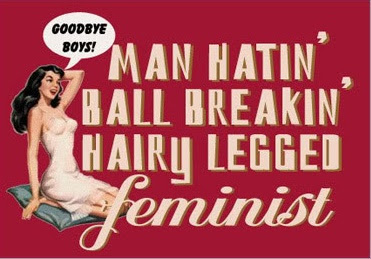 One of my Facebook friends' posts got me thinking this morning.
One of my Facebook friends' posts got me thinking this morning.What does the term feminist actually mean?
Let's start with our initial gut reactions to the term. Chances are you have already felt something just by reading the word feminist in print. Maybe it's positive, maybe it's negative. Independent of its dictionary definition, the word feminist has become provocative in recent years. We'll get back to that in a minute.
Here's the dictionary definition:
fem·i·nism
noun \ˈfe-mə-ˌni-zəm\Definition of FEMINISM
1: the theory of the political, economic, and social equality of the sexes— fem·i·nist noun or adjective2: organized activity on behalf of women's rights and interests
My Facebook friend posted because she gets incensed when she reads articles by people who take a pro-women's-health stance in the recent political debates on birth control, etc. -- yet these authors feel the need to state that they feel this way despite the fact that they are NOT feminists.
Somehow feminist became such a dirty word that people who arguably are feminists (at least, according to definition #1 above) feel the need to disown it.
And this is where Merriam-Webster's role ends and language becomes interesting. Dictionaries can't really capture the social, political, and historical events that give a word a particular connotation (at least, not until years later when that connotation has been well and truly set in stone, rather than being something that's still evolving).
Still, let's look at that definition for a minute. For most people, it's hard to take a stand against definition #1: "the theory of the political, economic, and social equality of the sexes." (Notice that religious equality and biological equality are not mentioned; I find that interesting.) If you come out and say that you think women should be subordinate to men, or not vote, or not own property, you sound like an anachronism from at least a century ago. Very few people nowadays would argue that basic women's rights should be taken away.
Definition #2 has a bit more going on. "Organized activity on behalf of women's rights and interests." Personally, I am a feminist according to definition #1. But according to definition #2, I am not a feminist. I have never taken part in organized activity on behalf of women's rights and interests (unless you count signing the occasional petition on behalf of Planned Parenthood). Taking that into consideration, someone like me might want to disown the term feminist because it is inaccurate.
But people don't get irate because of a simple inaccuracy. People get irate because of the unwritten definition of "feminist" held by certain right-wing conservatives. It might read something like, at its kindest, "Women we hate because they are trying to upset the status quo, and we like the status quo." Or, less kindly, "Man-hating, ball-busting, despicable women who need to be vilified and not taken seriously."
My friend argued on Facebook that we shouldn't allow the right wing to cast a spin on the term feminist. But I find myself coming at this from a more pragmatic perspective. The negative spin exists -- period. It's out there. It's not going anywhere. Fighting its negative spin is fighting a losing battle. I'd rather invent a completely new term -- social equalist, for instance -- and leave the past behind.
What do you think?


